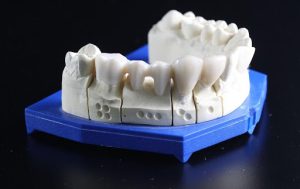If you’re considering dentures, there are a lot of things you need to know. How expensive they’re going to be, what sort of glue to hold them in with, and what sort of foods you can eat with them—you want answers to all of that, and you want it before we start. I’m no expert, but I hope to help you answer those questions today.
Table of Contents
What Can You Eat With Dentures?
When you first get dentures, you’ll want to take it slow, and only eat soft foods, or even liquids. After a while, though, you’ll get used to them and be more confident.
It’s recommended that, for the first two weeks, you eat only very soft foods and liquids. Yogurt is a good source of protein during this time, as is soft cheese. Mashed potatoes will help fill you up, with broth making the best meal.
The next two weeks, you can eat more solid foods, a little carefully. You can eat baked potatoes, for example, and well-cooked pasta, and soft bread. You should also be able to eat meat now, cut into very small pieces.
Finally, at the end of a month, you should be confident enough to eat even challenging foods, like large pieces of meat. Even whole apples and corn on the cob may be possible, but tread carefully. What’s possible can vary.

What Glue is the Best?
This is a difficult question to answer, but an important one. Different options are best for different people, of course, so you may need to try several options.
One variable is zinc. Zinc is a minor health risk, and there is some chance of swallowing a dental adhesive. If this concerns you, look for zinc-free formulas.
Some people find that their skin is sensitive to harsh chemicals. These people may want to look for an organic formula. It may be more expensive, but also much more comfortable.
If your dentures fit poorly, they may require a soothing denture cream to tide you over until your next appointment. And adhesive strips are by far the best for ease of use.
Another concern many people have is dry mouth, medically referred to as xerostomia. Those with dryer mouths may have difficulty with dentures. This article describes some of the ways you can try to deal with dry mouth.

How Long Will It Take?
Sometimes, the process of getting dentures can be quite long. The common process is referred to as “teeth in a day,” but actually, patients only get a temporary, uncomfortable plastic set of dentures that first day. The process to receive the final set can take upwards of ten months!
This also involves many more appointments, usually between five and ten, which also makes the process more expensive.
There is one new company, called Nuvia, trying to solve this problem. You can find them at https://www.nuviasmiles.com/. They claim they can get permanent dentures to patients the next day, with no need to worry about temps, and that patients can start on soft foods immediately, rather than starting with a liquid diet. It’s probably best to take some of these claims with a grain of salt, but they’re still dramatically better than their competition!
How Much Will it Cost?
A set of dentures usually costs $1000, on the low end, but they can be as high as $8000. The dental appointments to get them measured and adjusted are also a cost factor, but those vary so much that it’s almost impossible to get any idea of how much they will cost.
The biggest variable in cost is probably where you live. In areas where cost of living is extremely high already, like California and New York, the cost of dental appointments and dentures will be higher too. This goes both ways, though—the areas where cost of living is lowest are highly rural, such as South Dakota, and are unlikely to have the services available, which also makes it more expensive.
The quality of the dentures will also make a large difference in their cost. The highest-quality dentures are made from acrylic, a material with similar properties to actual teeth; lower-quality dentures are made from less expensive materials.
How Do You Care for Dentures?
Dentures are put in in the morning and removed at night. Removing them sounds like it might be a challenge, but it’s simplicity itself: just grab and pull. But then what?
Most people leave them soaking overnight in a specially-designed denture solution. This cleans them and kills bacteria, leaving them clean to put in your mouth in the morning. It’s also recommended to brush them at least once a day (whether they need to be in your mouth at the time is a matter of debate).
You should also clean out your own mouth after the dentures are removed, either by brushing just your gums or with mouthwash—or both! It’s almost certainly best to do both. You need to take care of your mental hygiene, at this point more than any other.

Conclusion
Dentures can be extremely intimidating. I know I wouldn’t want to have to wear fake teeth for the rest of my life. I couldn’t even stand my retainer when I was a teenager! But the field is advancing. The things that used to be so awful are improving by leaps and bounds.
There are a lot of variables to consider when taking this important step. Cost is an important one, but so is comfort, the food you can eat, and how long the process will take. Make sure to consider every aspect before making the decision; it’s hard to take back.
But it’s not all negative, either. Most people feel dramatically better with their new false teeth. They look better, and their confidence in the way their teeth look helps them to smile more. People with replacement teeth are likely to notice higher self-esteem and more enjoyment of the little things. Even if it comes with some concern about ability to eat certain foods, it’s still a dramatic improvement.





